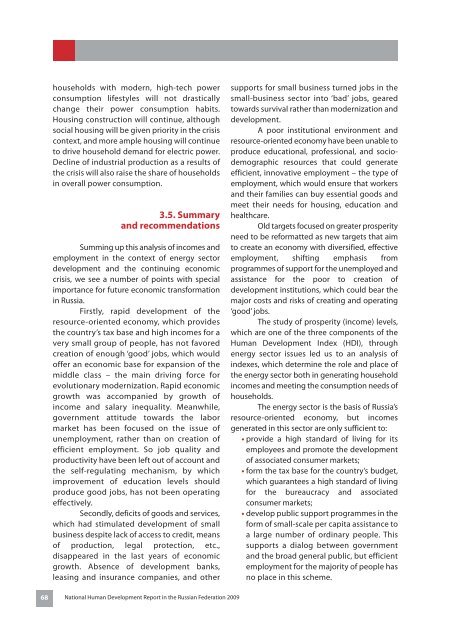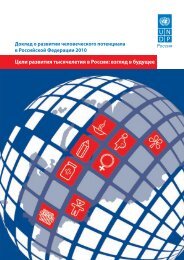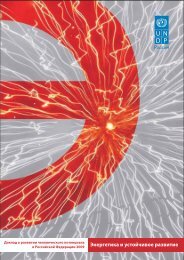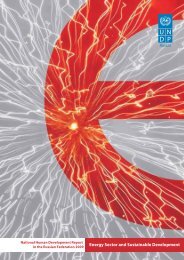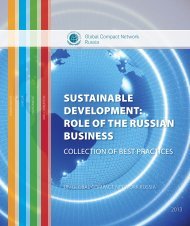Report - UNDP Russia
Report - UNDP Russia
Report - UNDP Russia
You also want an ePaper? Increase the reach of your titles
YUMPU automatically turns print PDFs into web optimized ePapers that Google loves.
households with modern, high-tech powerconsumption lifestyles will not drasticallychange their power consumption habits.Housing construction will continue, althoughsocial housing will be given priority in the crisiscontext, and more ample housing will continueto drive household demand for electric power.Decline of industrial production as a results ofthe crisis will also raise the share of householdsin overall power consumption.3.5. Summaryand recommendationsSumming up this analysis of incomes andemployment in the context of energy sectordevelopment and the continuing economiccrisis, we see a number of points with specialimportance for future economic transformationin <strong>Russia</strong>.Firstly, rapid development of theresource-oriented economy, which providesthe country’s tax base and high incomes for avery small group of people, has not favoredcreation of enough ‘good’ jobs, which wouldoffer an economic base for expansion of themiddle class – the main driving force forevolutionary modernization. Rapid economicgrowth was accompanied by growth ofincome and salary inequality. Meanwhile,government attitude towards the labormarket has been focused on the issue ofunemployment, rather than on creation ofefficient employment. So job quality andproductivity have been left out of account andthe self-regulating mechanism, by whichimprovement of education levels shouldproduce good jobs, has not been operatingeffectively.Secondly, deficits of goods and services,which had stimulated development of smallbusiness despite lack of access to credit, meansof production, legal protection, etc.,disappeared in the last years of economicgrowth. Absence of development banks,leasing and insurance companies, and othersupports for small business turned jobs in thesmall-business sector into ‘bad’ jobs, gearedtowards survival rather than modernization anddevelopment.A poor institutional environment andresource-oriented economy have been unable toproduce educational, professional, and sociodemographicresources that could generateefficient, innovative employment – the type ofemployment, which would ensure that workersand their families can buy essential goods andmeet their needs for housing, education andhealthcare.Old targets focused on greater prosperityneed to be reformatted as new targets that aimto create an economy with diversified, effectiveemployment, shifting emphasis fromprogrammes of support for the unemployed andassistance for the poor to creation ofdevelopment institutions, which could bear themajor costs and risks of creating and operating‘good’ jobs.The study of prosperity (income) levels,which are one of the three components of theHuman Development Index (HDI), throughenergy sector issues led us to an analysis ofindexes, which determine the role and place ofthe energy sector both in generating householdincomes and meeting the consumption needs ofhouseholds.The energy sector is the basis of <strong>Russia</strong>’sresource-oriented economy, but incomesgenerated in this sector are only sufficient to:• provide a high standard of living for itsemployees and promote the developmentof associated consumer markets;• form the tax base for the country’s budget,which guarantees a high standard of livingfor the bureaucracy and associatedconsumer markets;• develop public support programmes in theform of small-scale per capita assistance toa large number of ordinary people. Thissupports a dialog between governmentand the broad general public, but efficientemployment for the majority of people hasno place in this scheme.68 National Human Development <strong>Report</strong> in the <strong>Russia</strong>n Federation 2009


